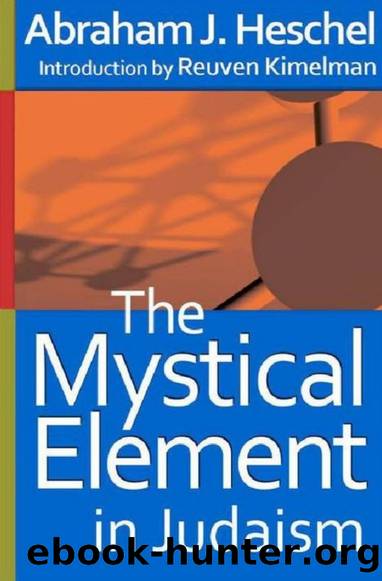The Mystical Element in Judaism by Abraham J. Heschel

Author:Abraham J. Heschel [Heschel, Abraham J.]
Language: eng
Format: epub
Barnesnoble:
Publisher: Varda Books
Published: 2013-12-25T05:00:00+00:00
6. THE TORAH â A MYSTIC REALITY
The Torah is an inexhaustible esoteric reality. To enter into its deep, hidden strata is in itself a mystic goal. The Universe is an image of the Torah and the Torah is an image of God. For the Torah is âthe Holy of Holiesâ; âit consists entirely of the name of the Holy One, blessed be He. Every letter in it is bound up with that Name.â55
The Torah55a is the main source from which man can draw the secret wisdom and power of insight into the essence of things. âIt is called Torah (lit.: showing) because it shows and reveals that which is hidden and unknown; and all life from above is comprised in it and issues from it.â56 âThe Torah contains all the deepest and most recondite mysteries; all sublime doctrines both disclosed and undisclosed; all essences both of the higher and the lower grades, of this world and of the world to come are to be found there.â57 The source of wisdom is accessible to all, yet only few resort to it. âHow stupid are men that they take no pains to know the ways of the Almighty by which the world is maintained. What prevents them? Their stupidity, because they do not study the Torah; for if they were to study the Torah they would know the ways of the Holy One, blessed be He.â58
The Torah has a double significance: literal and symbolic. Besides their plain, literal meaning, which is important, valid and never to be overlooked, the verses of the Torah possess an esoteric significance, âcomprehensible only to the wise who are familiar with the ways of the Torah.â59 âHappy is Israel to whom was given the sublime Torah, the Torah of truth. Perdition take anyone who maintains that any narrative in the Torah comes merely to tell us a piece of history and nothing more! If that were so, the Torah would not be what it assuredly is, to wit, the supernal Law, the Law of truth. Now if it is not dignified for a king of flesh and blood to engage in common talk, much less to write it down, is it conceivable that the most high King, the Holy One, blessed be He, was short of sacred subjects with which to fill the Torah, so that He had to collect such commonplace topics as the anecdotes of Esau, and Hagar, Labanâs talks to Jacob, the words of Balaam and his ass, those of Balak, and of Zimri, and such-like, and make of them a Torah? If so, why is it called the âLaw of Truth?â Why do we read âThe Law of the Lord is perfect ⦠The testimony of the Lord is sure ⦠The Ordinances of the Lord are true ⦠More to be desired are they than gold, yea, than much fine goldâ (Ps. 19:8â11). But assuredly each word of the Torah signifies sublime things, so that this or that narrative, besides its meaning in and for itself, throws light on the all-comprehensive Rule of the Torah.
Download
This site does not store any files on its server. We only index and link to content provided by other sites. Please contact the content providers to delete copyright contents if any and email us, we'll remove relevant links or contents immediately.
| Hebrew Bible (Old Testament) | Talmud |
| Torah | Zohar |
The Power of Habit by Charles Duhigg(3130)
Man's Search for Meaning by Viktor E. Frankl(2670)
Mckeown, Greg - Essentialism: The Disciplined Pursuit of Less by Mckeown Greg(2440)
MOSES THE EGYPTIAN by Jan Assmann(2412)
Devil, The by Almond Philip C(2326)
The Complete Dead Sea Scrolls in English (7th Edition) (Penguin Classics) by Geza Vermes(2277)
Unbound by Arlene Stein(2268)
I Capture the Castle by Dodie Smith(2034)
Schindler's Ark by Thomas Keneally(1879)
The Invisible Wall by Harry Bernstein(1799)
The Gnostic Gospel of St. Thomas by Tau Malachi(1794)
The Bible Doesn't Say That by Dr. Joel M. Hoffman(1677)
The Secret Doctrine of the Kabbalah by Leonora Leet(1607)
Political Theology by Carl Schmitt(1579)
The Jewish State by Theodor Herzl(1533)
A History of the Jews by Max I. Dimont(1529)
The Dead Sea Scrolls Bible by Martin G. Abegg(1513)
The Book of Separation by Tova Mirvis(1486)
Oy!: The Ultimate Book of Jewish Jokes by David Minkoff(1369)
